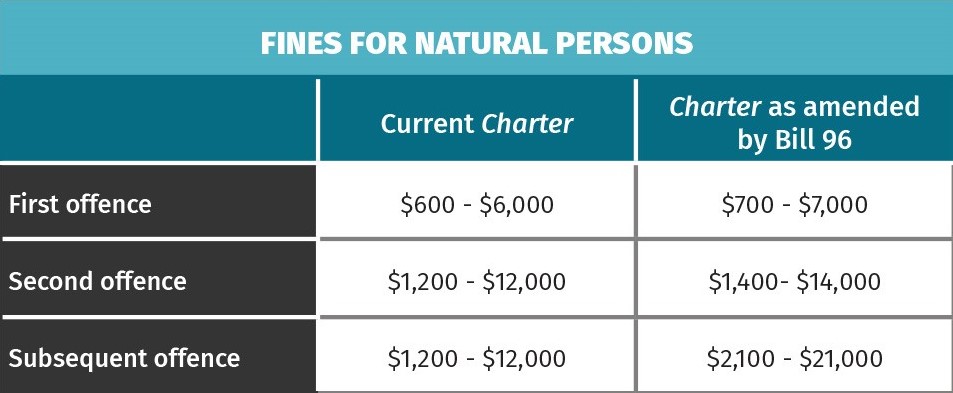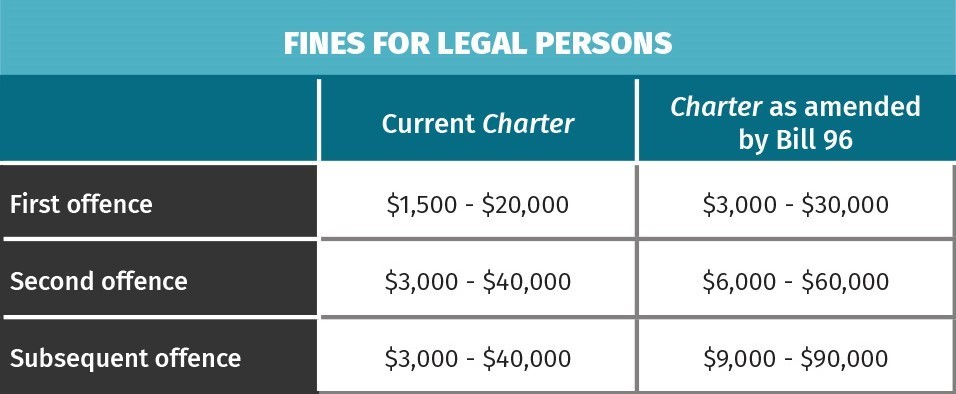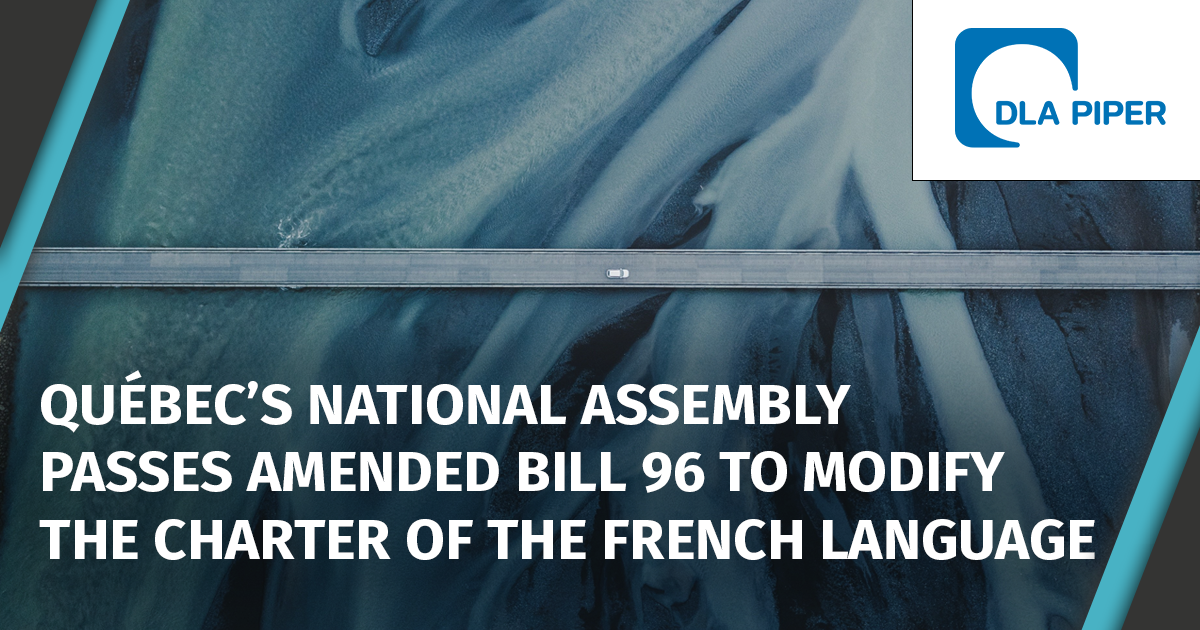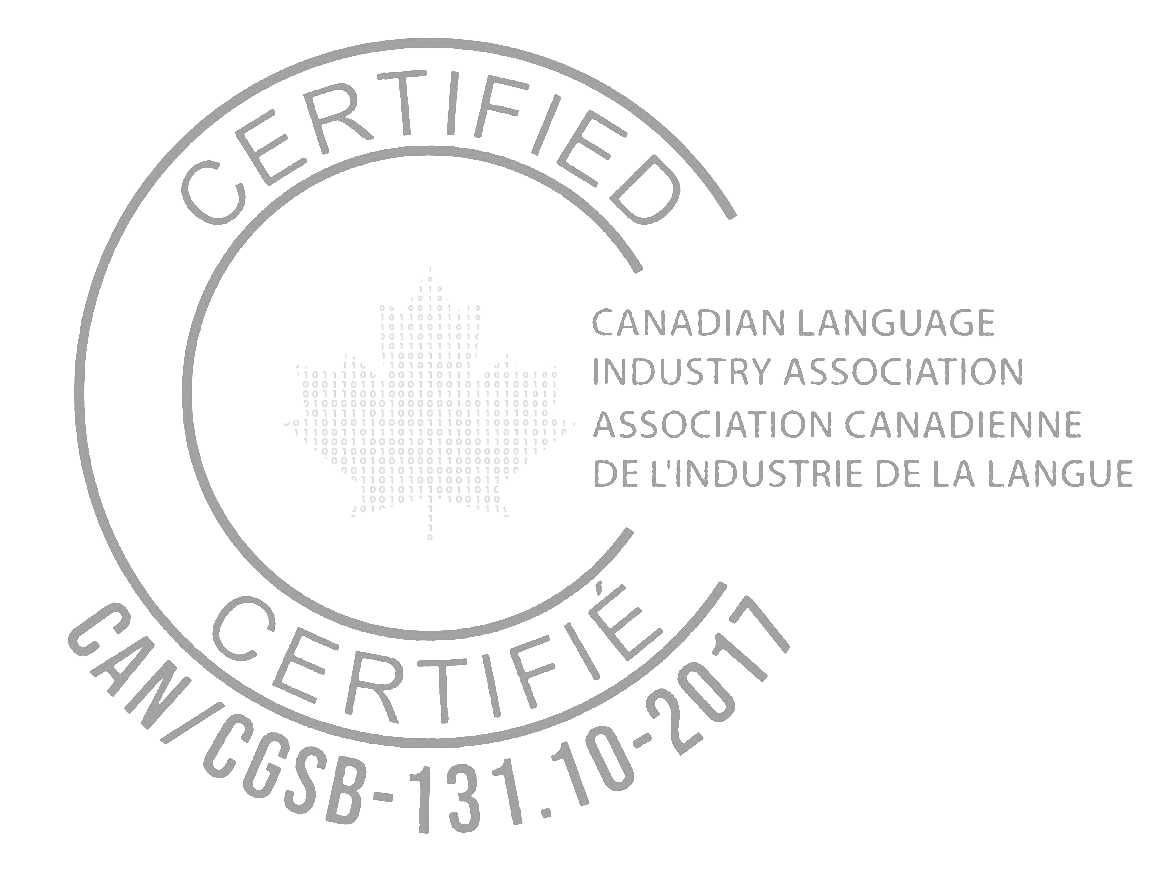What are the practical implications for businesses and employers in Québec?
This article was originally authored and published by DLA Piper (Stephanie Blakely, Tania Da Silva, Pablo Guzman).
Regulatory Update | 31 May 2022
On May 13th, 2021, Québec's National Assembly tabled Bill 96, An Act respecting French, the official and common language of Québec ("Bill 96") which proposes significant changes to the Charter of the French Language, commonly known as Bill 101 (the "Charter"), aimed at ensuring the vitality of the French language in Québec. On November 4th, 2021, Members of the National Assembly from all four parties voted unanimously in favour of the "passage in principle" of Bill 96.
On May 12, 2022, the National Assembly adopted Bill 96 with amendments after taking into consideration the report of the Commission on Culture and Education. On May 24, 2022, Bill 96 officially passed into law with the majority of the National Assembly voting in favour of it.
In light of this, changes are coming to Québec's French language requirements, and businesses should prepare for their impact. Businesses operating in Québec or having employees in the province should become familiar with the changes to the Charter as amended by Bill 96. The following article provides a general overview of some of the key takeaways of Bill 96.
LANGUAGE OF THE WORKPLACE
Communications to employees:
Under Bill 96, all offers of employment, transfer or promotion will have to be made in French, and all communications and documentation relating to employment, including those after termination, will also have to be drawn up and made available to workers in French. This specifically includes internal material such as training documents that do not currently have to be provided in French.
Employment agreements:
Bill 96 stipulates that employees may only be bound by employment agreements in a language other than French that contain standard clauses or which are contracts of adhesion if they first examine the French version and it is their express wish to be bound by the agreement in a language other than French. As such, employers will be required to provide Québec employees with a French employment agreement first. Unlike in the past, this change will therefore prohibit employers from simply providing Québec employees with their standard employment agreements in another language than French and including a "choice of language" provision whereby the parties expressly choose to contract in a language other than French. However, this rule would not apply to individually negotiated employment agreements, which may be drawn up exclusively in a language other than French at the express wish of the parties.
Hiring:
With respect to the hiring process, Bill 96 strictly regulates the requirement of knowledge of a language other than French. As a general rule, requiring knowledge of a language other than French as a condition for employment remains prohibited, unless the nature of the employment duties specifically requires such knowledge. However, in the case where the job does require the knowledge of a language other than French, Bill 96 requires that employers to take all reasonable means to avoid such a requirement. Therefore, for an employer to be able to require the knowledge of a language other than French, they will need to demonstrate that they:
- assessed the actual language needs associated with the job duties;
- ensured that the language skills required of other staff members were insufficient for the performance of the job duties being hired for; and
- restricted as much as possible the number of positions involving tasks that require the knowledge or a specific level of knowledge of a language other than French.
This criteria will also apply to employees who are promoted or transferred within a company.
Job offers:
Bill 96 requires that employers advertising a job offer in a language other than French simultaneously advertise the job offer in French using transmission means of the same nature and reaching a target public of a proportionally comparable size.
Discrimination and Harassment:
Bill 96 provides a new recourse to employees who believe that they have been the victims of discrimination or harassment due to the fact that they have little or no command of a language other than French, because they have claimed the possibility to express themselves in French, or because they have demanded that a Charter right be respected. Bill 96 imposes a positive obligation on Quebec employers to take reasonable means to prevent such conduct and to put a stop to any such conduct if it is brought to their attention. An employee will have 45 days of the occurrence of an incident to file a claim with CNESST.
FRANCIZATION
Francization is a set of rules aimed at ensuring that the use of French is generalized in all aspects of larger companies in Québec. Currently, any company employing 50 or more employees for a period of at least six months must register with the Office Québécois de la langue française ("OQLF") and obtain a francization certificate attesting that French is the language used at all levels of the company. Bill 96 proposes to lower this threshold to companies with 25 or more employees in Quebec.
Furthermore, Bill 96 will expand the investigative and inspection powers of the OQLF. As is currently the case under the Charter, companies employing 100 or more employees are obliged to have a francization committee and the OQLF may order companies employing between 50 to 99 employees to form such a committee. However, the OQLF will now also be able to order the creation of francization committees within a company employing between 25 and 49 employees, if it deems the use of French is not sufficiently widespread at all levels of the company.
The OQLF may also identify businesses with as few as 5 employees in certain key sectors to which it will offer French language learning services provided by Francisation Québec, a new agency of the Ministry of Immigration, Francisation and Integration. A company that implements French language learning services provided by Francisation Québec is required to allow the persons in its employment who are unable to communicate in French to receive those services in class, online and in the workplace.
Moreover, to enforce francization rules, the OQLF will publish and keep up to date a list of non-compliant companies with which the Government of Québec shall not contract or grant a subsidy. Going forward, it will be ever more important for companies to comply with the francization rules, as the threat of preclusion from government contracts weighs heavy in many industries. Pursuant to Bill 96, the OQLF will also be able to apply for injunctions from the Superior Court of Québec to force compliance with the Charter’s requirements. See below for more information on penalties for non-compliance.
LANGUAGE OF JUSTICE
Bill 96 states that "every person has a right to justice and legislation in French". Currently, legal persons can file legal proceedings in either French of English. Going forward, English pleadings must be accompanied by a certified French translation, at the parties' expense. Consequently, Anglophone parties will have to rely strongly on the bilingualism of their lawyers to ensure that nothing is "lost in translation" and that pleadings accurately and faithfully present the facts. Alternatively, they will have to bear the cost of certified translations of their pleadings. Bill 96 does not provide
for any exception to this rule, even where all parties consent to proceed in English.
Although the Canadian Charter of rights and freedoms allows pleading in English or French, judges will not be required to have knowledge or a specific level of knowledge of a language other than French, unless the exercise of that office requires it and that all reasonable means have been taken to avoid imposing such a requirement. As such, parties may be required to plead their case in French if they are faced with a French-speaking Court.
Any person may request to have an English judgment translated into French, at the cost of the government/body/department that rendered the judgment. Any party may request to have a French judgment translated into English, at the cost of the government/body/department issuing it. The same rule applies to decisions rendered by an agency of the civil administration or an appointed person exercising an adjudicative function within such an agency.
LANGUAGE OF CIVIL ADMINISTRATION
Bill 96 establishes French as the exclusive language of communication for the civil administration in Québec. Written documents sent to the civil administration to enter into a contract or agreement, related to a contract or agreement to which the civil administration is a party, and written documents sent under such a contract or agreement will have to be drawn up in French. A version in another language may be attached to the French version. Exceptionally, this rule does not apply where the civil administration enters into a contract outside of Québec.
The use of French will also be required when a legal person renders services to the Government.
Applications for a permit or other authorizations will have to be drawn up exclusively in French. A failure to use French in dealings with the Government could result in suspension or revocation of a permit or other authorization
issued by the Government.
LANGUAGE OF BUSINESS AND COMMERCE: PUBLIC SIGNS, COMMERCIAL ADVERTISING AND REGISTRATIONS
Contracts of adhesion:
Bill 96 requires that a company submit the French version of the standard form contract first. Only after the other party has examined the French version can the parties jointly choose to be bound by a version drawn up in a language other than French. It is noteworthy that no party to such a contract may require from the other party any sum whatsoever for the cost of drawing up of the French version of the contract or of any related documents. This change will therefore prohibit parties from simply drawing up the contract in another language than French and include a "choice of language" provision whereby the parties expressly choose to contract in a language other than French, as the rule is currently interpreted under the Charter.
Similar obligations will exist when drafting certain contracts for real estate transactions and for invoices, receipts, acquittances (waivers) and other documents of the same nature.
A violation of these requirements may result in the contract being declared null and void. As a result, businesses will need to be particularly careful to adhere to the above rules. See the section on penalties below for more information on the risks of non-compliance.
Trademarks, posters, signs and commercial advertising:
A significant change under Bill 96 is to narrow the trademark exception and mandate the clear predominance of French in the public display of trademarks. Currently, 1) a recognized trademark under Canadian legislation (i.e. common law trademarks and trademarks for which registration is pending) may appear on public signs and posters in a language other than French, and 2) only a sufficient presence of French is required to also appear on public signs and posters. This is typically done by including a French descriptor to accompany the name of the storefront that is a recognized trademark. Under Bill 96, 1) only registered trademarks in a language other than French and for which no corresponding French version exists may appear in signs, posters and commercial advertising, and 2) French must be "markedly predominant" (i.e. twice as large or otherwise carrying more of a visual impact than the other language) on all public signs and posters visible from outside premises. Moreover, the French generic term or a description of the products or services concerned, slogan, or any other term or indication providing information about the products or services to consumers about the site must be "markedly predominant" if they are visible from outside premises. This change may have a significant impact on businesses that advertise and sell products or services in Québec: they will have to ensure the registration of their trademarks and review all signs, posters and commercial advertising to ensure compliance with these new requirements.
Registration of security:
The Civil Code of Québec will be amended to require all registrations of security on movable and immovable property in Québec to be exclusively in French. As such, all applications for registration required to register security at the Land Register and the Register of Personal and Movable Real Rights ("RPMRR") must be drawn up in French.
In addition, all accompanying documents must also be either drawn up in French or accompanied by a certified translation. For example, deeds of sale, deeds of hypothec, notices of lease and notices of radiation of a registered right must either be drawn up in French or be accompanied by a certified translation. More specifically relating to the RPMRR, when filling out the prescribed form to register security on movable property, the description of the assets to be charged must be in French. It is critically important that the translated description be verified as accurate, otherwise creditors may find themselves unwillingly exposed to financing risk.
Amendments must also be in French, but there will be an exception for amendments or corrections to documents already registered in English prior to the coming into force of Bill 96.
Increased penalties and other consequences of non-compliance
Fines for violations of the Charter will increase as follows under Bill 96:


Under Bill 96, an offence continuing for more than one day may constitute a separate offence for each day it continues.
Directors of the legal person, partnership or association are also presumed to have committed the offence and may be held personally liable, unless they exercised due diligence. The fines for offences committed by a director or officer of a legal person are double those applicable to a natural person. Therefore, director and officer fines range from $1,400 to $14,000 for a first offence, $2,800 to $28,000 for a second offence and $4,200 to $42,000 for a subsequent offence.
Lastly, but of great importance, Bill 96 also creates a new right of action which will allow individuals who believe their French language rights have been violated under the Charter to bring a civil action against an offending party.
CONCLUSION
In light of the above, businesses with a Québec presence should prepare and take the necessary steps in the immediate to be in compliance with the Charter and any new obligations created by Bill 96.
Although Bill 96 has been passed, at the time of drafting of this article, it has not yet received royal assent to bring it into effect. This is expected to happen soon, and will establish the various deadlines for compliance with the legislative changes set out in Bill 96.
This article provides only general information about legal issues and developments, and is not intended to provide specific legal advice. Please see disclaimer for more details.














